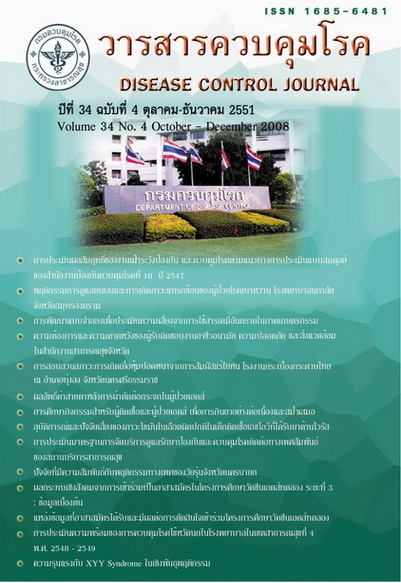Evaluation of Prevention and Control of Avian Influenza in Community in 2005
Keywords:
Avian Influenza, Prevention and control in communityAbstract
Since 2004, Avian Influenza (AI) infection control policy has been emphasized in order to solve the AI problem in Thailand. This study was aimed to know the levels of knowledge, attitude and practice of AI disease control, public perception, types of poultry farming, as well as the participation of village health volunteers (VHV) in AI disease surveillance in infected H5N1 poultry area and non-infected area. In comparing between infected versus non-infected area, a survey was carried out in 12 regions, with 30 villages in each region, comprising a total of 8,958 population, 3,068 poultry farmers and 3,106 VHV (3-5 per village). It was found that overall public knowledge level in AI was good. However, there were some misunderstandings such as AI was caused only from chicken (36%), wearing gloves or plastic bag was unnecessary in dealing with sick and dead poultry (34%) and poultry feces didn’t contain virus (52.8%). In determining the attitude and practice aspects, overall level was moderate. Nonetheless, there were some attitudes against the proper disease control, e.g. washing with soap after poultry handling was difficult (51.6%). There were also several malpractices, such as no hand washing after contact with poultry (40.1%). After comparing the knowledge, attitude and practice between people who lived in H5N1 infected and non-infected area, we found that their knowledge in disease control was similar. Yet, the attitude of those living in the infected area was more supportive to disease control than that of the non-infected counterpart (p 0.05), whereas the practice of people in the non-infected area was considered better when compared to that of the infected area (p 0.05). For route of disease control aspect, risk communication was mostly achieved by means of television broadcasting (66.1%). Other means were health personnel (7.4%) and VHV (6%). The percentage of free-range farming styles, including local cocks, fighting cock and ducks were 74.3%, 52% and 63.2% respectively. The infected area was found to have less freerange farming (p 0.05). Good level of knowledge was seen among VHV except that there were some misunderstandings. Many believed that kissing or suckling healthy fighting cocks was safe (39%), some even think that it was safe to eat sick chicken (30.3%) and that kids playing in poultry feeding area were not prone to infection (36.6%). VHV in infected area had more disease surveillance activities and more social support in disease control than their noninfected counterpart (p 0.05). However, there was insufficient support in many aspects especially personal protective equipment, for examples, gloves and masks (60.8%). VHV were much involved in educating the community in disease surveillance and sick poultry observation, but they had small involvement in poultry culling (28.1%). Also, the clinical observation in human cases was still relatively low (69.3%). So it is essential to communicate the risk of AI, to provide support in community development, and to encourage VHV to actively participate in building the appropriate attitude and practice in AI disease prevention and control in Thailand.
Downloads
References
2. ดารินทร์ อารีย์โชคชัย, ชุลีพร จิระพงษา, วรรณา หาญเชาวกุล, พจมาน ศิริอารยาภรณ์, นายยงเจือ เหล่าศิริถาวร, Mr. Michael Oreilly และคณะ. Risk factor of Avian Flu in Thailand, [online] May 2004 [cited 2007 Feb 1]; Available from: URL: http://203.157.19.193/invest/ai/july47/H5N1_Darin.pdf
3. กรมสนับสนุนบริการสุขภาพ กระทรวงสาธารณสุข, สถาบันวิจัยและพัฒนามหาวิทยาลัยรามคำแหง. การเฝ้าระวังพฤติกรรมสุขภาพเพื่อป้องกันโรคไข้หวัดนก. 2547. [cited 2006 Jun 7]; Avail able from: URL: http://www.thai hed.com/html
4. ปราบดา ประภาศิริ, Olsen S, ครรชิต ลิมปกาญจนารัตน์, ยงเจือ เหล่าศิริถาวร, ดาริกา พัฒนสิน. ความรู้ ทัศนคติ และการปฏิบัติตัวก่อนและหลังได้ยินข่าวเกี่ยวกับไข้หวัดนก จังหวัดนครพนม. ตุลาคม 2547. [cited 2005 Jan 9]; Avialable from URL. http://epid.moph. go.th/invest/Avian11_oct_47.html
5. Fleiss. Statistical Methods for Rates and Proportions. 2nd Ed. London: Wiley; 1981.
6. คณะกรรมการป้องกันและควบคุมโรคไข้หวัดนก กระทรวงสาธารณสุข. คู่มือการปฏิบัติงานโรคไข้หวัดนก สำหรับบุคลากรด้านการแพทย์และสาธารณสุข. พิมพ์ครั้งที่ 1. กรุงเทพมหานคร: ชุมนุมสหกรณ์การเกษตรแห่งประเทศไทย; 2548.
7. ประภาเพ็ญ สุวรรณ. ทัศนคติ : การวัดการเปลี่ยนแปลงและพฤติกรรมอนามัย. พิมพ์ครั้งที่ 3. กรุงเทพมหานคร: ไทยวัฒนาพานิช; 2537.
8. วาสนา จันทร์สว่าง, นาตยา เกรียงชัยพฤกษ์, ยุทธพงษ์ ขวัญชื้น, วิทยา เทียนจวง, พงศ์พันธ์ อันตะริกานนท์, นิทัศน์ ศิริโชติรัตน์. กระบวนการสื่อสารการรณรงค์ ด้านสุขภาพ. กรุงเทพมหานคร: คณะสาธารณสุขศาสตร์ มหาวิทยาลัยมหิดล/
กองสุขศึกษา กระทรงสาธารณสุข /สถาบันวิจัยระบบสาธารณสุข; 2548.
9. ปาริชาต สถาปิตานนท์, กิตติ กันภัย, พัฒนพงศ์ จาติเกตุ, ปิยะนารถ จาติเกตุ. การสื่อสารสุขภาพ : ศักยภาพของสื่อมวลชนในการสร้างเสริมสุขภาพ. กรุงเทพมหานคร: จุฬาลงกรณ์มหาวิทยาลัย; 2546.
10. ศูนย์ควบคุมโรคไข้หวัดนก สำนักควบคุมป้องกันและบำบัดโรคสัตว์. การควบคุมโรคไข้หวัดนกในประเทศไทย. พิมพ์ครั้งที่ 1. กรุงเทพมหานคร: ชุมนุมสหกรณ์ เพื่อการเกษตรแห่งประเทศไทย จำกัด; 2549.
11. WHO Consultation on Human Influenza A/H5. Avian Influenza A (H5N1) Infection in Humans. N Engl J Med. 2005; 353: 1374-85.
Downloads
Published
How to Cite
Issue
Section
License
Articles published in the Disease Control Journal are considered as academic work, research or analysis of the personal opinion of the authors, not the opinion of the Thailand Department of Disease Control or editorial team. The authors must be responsible for their articles.






